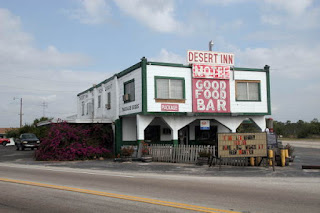 |
| Desert Inn was added to the National Register of Historic Places in 1994. Florida State Archives/McDonald |
By Jane Feehan
Yeehaw Junction. The name draws a smile from those who pass its exit along Florida's Turnpike. This town of fewer than 300 serves as a stopping point for gas and at one time, tickets for Orlando tourist attractions, food and lodging.
The site of a few gas stations, a motel and now the closed Desert Inn, the town, at this writing, has no police or fire station, bank or schools. Legend says it once served as a cattle trail stop and an Indian trading post in the 1800s. In fact, Yeehaw Junction sat along the Okeechobee branch of the Florida East Coast Railway, which had set up one of its many water depots nearby (there were many along the railway’s route). The branch closed decades ago, lowering the curtain on its development.
While South Florida growth led the nation during the 1950s, Yeehaw Junction remained static. In 1960, Miami real estate titan J.A. Cantor bought much of the town’s leased property and set out to create Central City. Billboards proposed a modern community with amenities alien to residents, but for whatever reasons, plans fell to the wayside.
In 2002, the Pentagon revealed Yeehaw Junction was a secret test site (among 27) for biological warfare. In 1968, during the height of the Cold War, wheat rust, a variety of Puccinia graminis, was sprayed over fields four times in hopes of developing a fungus strong enough to kill wheat crops of an enemy during warfare.
During the 1980s, state officials proposed a 122-room Yeehaw Junction motel be converted to a 200-man prison. Though a few residents hoped a prison would boost job growth and its economy, others joked the town would be known as “Jailhouse Junction.” The proposal failed.
Since then, travelers and truckers continue to stop for gas and restrooms. Its Desert Inn, first built in 1889, was added to the National Register of Historic Places in 1994. The only place in town for nightlife and reasonable food, the inn recently closed. A voicemail message at the establishment says it’s closed indefinitely. In 2019, a truck with an orange juice cargo ran through an intersection into the building, severly damaging the structure.
Boom times again come to Florida—again sidestepping Yeehaw Junction. Developers and potential residents might be interested the town sits 69 feet above sea level, not prone to flooding.
Sources
Fort Lauderdale News, Sept. 25, 1960
Fort Lauderdale News, Aug. 17, 1986
Tampa Tribune, Jan. 24, 1995
Orlando Sentinel, Oct. 10, 2002
Tampa Bay Times, Dec. 22, 2019
WPTV.com 2019
Tags: Florida history, Yeehaw Junction, Florida’s Turnpike, Jane Feehan, film researcher, Florida development, Osceola County, National Register of Historic Places, biological warfare

